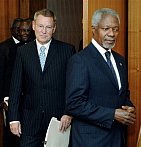 UNITED NATIONS, Oct. 31 (UPI) — The United Nations has extended investigation of former Lebanon Prime Minister Rafik Hariri’s assassination into Syria, demanding full cooperation of Damascus. The Security Council Monday unanimously approved a tough resolution giving the U.N. International Independent Investigation Commission the same rights in Syria it already has in Lebanon. The measure said that if Syria’s cooperation does not meet the resolution’s requirements, "the council, if necessary, could consider further action."
UNITED NATIONS, Oct. 31 (UPI) — The United Nations has extended investigation of former Lebanon Prime Minister Rafik Hariri’s assassination into Syria, demanding full cooperation of Damascus. The Security Council Monday unanimously approved a tough resolution giving the U.N. International Independent Investigation Commission the same rights in Syria it already has in Lebanon. The measure said that if Syria’s cooperation does not meet the resolution’s requirements, "the council, if necessary, could consider further action."
Meeting at the ministerial level, the resolution also said the panel, headed up by German prosecutor Detlev Mehlis, may determine where and how it interviews Syrians and "insists that Syria not interfere in Lebanese domestic affairs." The measure calls on Syria to "detain those Syrian officials or individuals whom the commission considers as suspected of involvement in the planning, sponsoring, organizing or perpetrating of" the Feb. 14 bomb attack in Beirut on Hariri’s motorcade, killing the billionaire businessman and more than 20 other people.
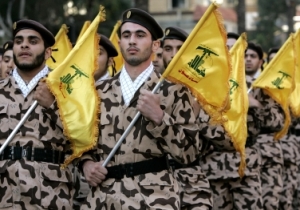 Lebanon is bracing for another showdown. When Syria’s troops withdrew from the country six months ago, the Lebanese hoped to have seen the last of foreign forces inside their borders but Syrian backed Palestinian guerrillas are emerging as a fresh threat to Lebanon’s stability. They are part of a 350,000-strong Palestinian population who have been in Lebanon since Israel’s war of independence in 1948.
Lebanon is bracing for another showdown. When Syria’s troops withdrew from the country six months ago, the Lebanese hoped to have seen the last of foreign forces inside their borders but Syrian backed Palestinian guerrillas are emerging as a fresh threat to Lebanon’s stability. They are part of a 350,000-strong Palestinian population who have been in Lebanon since Israel’s war of independence in 1948. 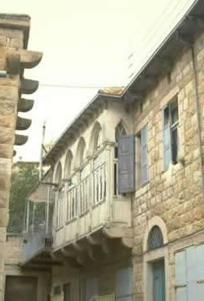 AKKAR, 26 October (IRIN) – Hasna Jawad, 23, considers herself lucky. Even though she lives in the poor and remote village of al-Mjdel in the northern Akkar region of Lebanon, she is able to continue her studies
AKKAR, 26 October (IRIN) – Hasna Jawad, 23, considers herself lucky. Even though she lives in the poor and remote village of al-Mjdel in the northern Akkar region of Lebanon, she is able to continue her studies 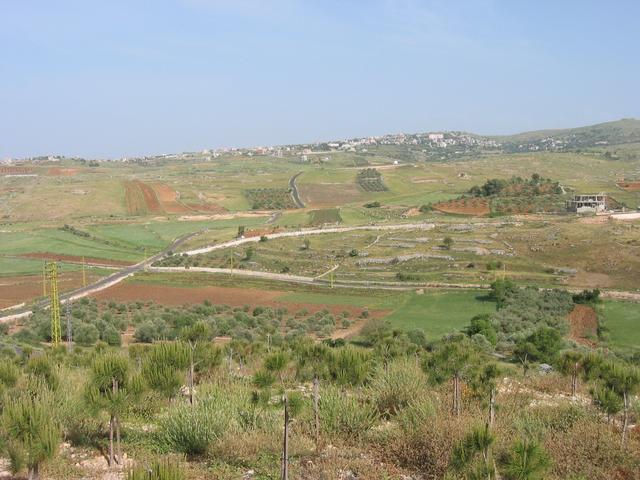 BINT JBEIL, 24 October (IRIN) – Riad Ataya pointed out of a window to a small vessel in the Mediterranean Sea off the coast of Naqoura, some 100 kilometres south of Lebanese capital Beirut. "Look
BINT JBEIL, 24 October (IRIN) – Riad Ataya pointed out of a window to a small vessel in the Mediterranean Sea off the coast of Naqoura, some 100 kilometres south of Lebanese capital Beirut. "Look 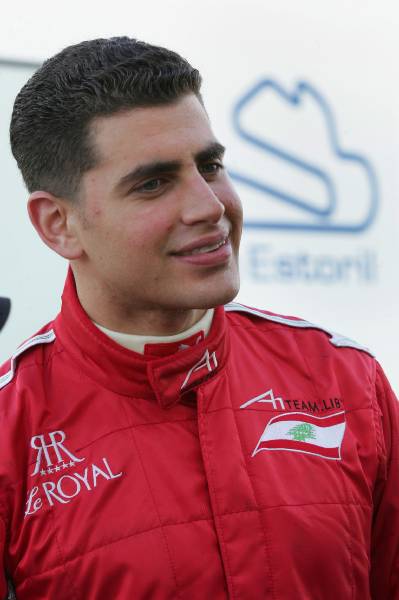 A1 Team Lebanon brought its national flag-liveried car home in eleventh place at Estoril, Portugal today, the best finish for the team so far in this inaugural A1 Grand Prix series. It was the first A1 Grand Prix race start for driver, Basil Shaaban, while team mate Khalil Beschir supported Lebanon from the Al Jazeera commentary booth, assisting with the live broadcast to the Arab world. In the first race Shaaban started from 23rd place and by the end of the first lap had improved to 18th .and gained two further positions to run much of the race in 16th place. As the 18 lap race reached its closing stages Shaaban came under pressure from 17th placed A1 Team Austria and in the ensuing battle Shaaban used all his skills and the PowerBoost button to keep the Austrian at bay until being pushed wide and into the gravel, losing two places and finishing 18th .
A1 Team Lebanon brought its national flag-liveried car home in eleventh place at Estoril, Portugal today, the best finish for the team so far in this inaugural A1 Grand Prix series. It was the first A1 Grand Prix race start for driver, Basil Shaaban, while team mate Khalil Beschir supported Lebanon from the Al Jazeera commentary booth, assisting with the live broadcast to the Arab world. In the first race Shaaban started from 23rd place and by the end of the first lap had improved to 18th .and gained two further positions to run much of the race in 16th place. As the 18 lap race reached its closing stages Shaaban came under pressure from 17th placed A1 Team Austria and in the ensuing battle Shaaban used all his skills and the PowerBoost button to keep the Austrian at bay until being pushed wide and into the gravel, losing two places and finishing 18th . 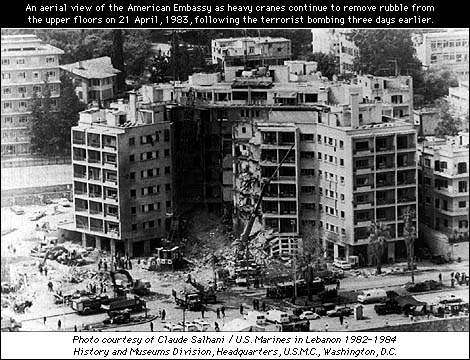 JACKSONVILLE – Every day on her way to work, Ruthann Bland drives alongside the column of pear trees, past the memorial and its solitary bronze Marine.Every day, she remembers her husband, the pictures on the television and the knock at the door.A 58-year-old Hubert resident, Bland lost her husband, Lance Cpl. Stephen Bland, on Oct. 23, 1983, a truck packed with explosives crashed through a barricade, past a sentry post and into the lobby of a Marine compound – 241 U.S. troops were killed, most of them Marines and sailors from 1st Battalion, 8th Marines. Stephen Bland was one of them."I was actually asleep, and I got a phone call," Ruthann Bland said. "It was my neighbor across the street asking me how my husband was. She said to go turn the TV on. That’s when I saw the building had been bombed."It was days before she was told her husband had died in the blast. "The whole time I’m thinking, I just got a letter from my husband," she said. "I’m really optimistic that it’s not him. I got the knock on the door, I was totally blown away."The bombing that killed Bland’s husband and his comrades remains the worst terrorist attack against Americans on foreign soil. Here in Jacksonville, it’s nearly impossible to forget about the Beirut tragedy. The pear trees lining N.C. 24 represent the lives lost, and a somber memorial sits close to the Camp Johnson gate.
JACKSONVILLE – Every day on her way to work, Ruthann Bland drives alongside the column of pear trees, past the memorial and its solitary bronze Marine.Every day, she remembers her husband, the pictures on the television and the knock at the door.A 58-year-old Hubert resident, Bland lost her husband, Lance Cpl. Stephen Bland, on Oct. 23, 1983, a truck packed with explosives crashed through a barricade, past a sentry post and into the lobby of a Marine compound – 241 U.S. troops were killed, most of them Marines and sailors from 1st Battalion, 8th Marines. Stephen Bland was one of them."I was actually asleep, and I got a phone call," Ruthann Bland said. "It was my neighbor across the street asking me how my husband was. She said to go turn the TV on. That’s when I saw the building had been bombed."It was days before she was told her husband had died in the blast. "The whole time I’m thinking, I just got a letter from my husband," she said. "I’m really optimistic that it’s not him. I got the knock on the door, I was totally blown away."The bombing that killed Bland’s husband and his comrades remains the worst terrorist attack against Americans on foreign soil. Here in Jacksonville, it’s nearly impossible to forget about the Beirut tragedy. The pear trees lining N.C. 24 represent the lives lost, and a somber memorial sits close to the Camp Johnson gate.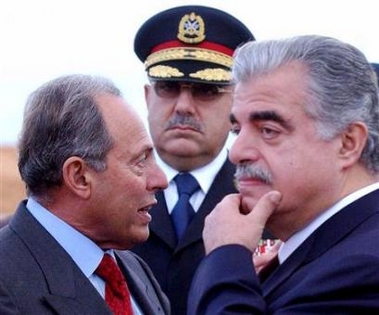 By Barry Schweid, Associated Press |
By Barry Schweid, Associated Press | 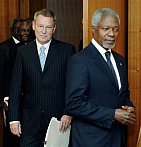 UNITED NATIONS Oct 20, 2005
UNITED NATIONS Oct 20, 2005 


